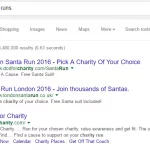Google Grants 1: getting started with Google Grants
The Google Grant is a free search advertising programme that affords charities and non-profits nearly $10000/month in Google Adwords budget (that’s £6,588 a month at today’s rate). At Chameleon Net we help charities like The RNID, The Anthony Nolan Trust and Friends of the Earth apply for, and get value from their Google Grant. In our experience The Grant is a fantastic channel for fundraising whether you’re a small or large UK charity or voluntary organisation.
Sponsored search results are a form of advertising delivered via Google AdWords. They look like this:
You find these ads at the top and bottomof top of a search engine results page (SERP). Your ad’s position is determined by the relevancy of your ad to the keyword searched for, and your bid for that particular keyword (aka search term or query). If your ad is clicked, you will be charged by Google. However, a Google Grantee receives $10000 of clicks a month for free.
Just think of all those terms you’d love your charity to rank number 1 for… a Google Grant would allow you almost unlimited budget to chase that coveted top spot.
So how does your charity go about getting one? A Google Grant application can take a long time – sometimes nearly 6 months! (Charities who have utilised our services have found we speed up this process dramatically). A Google Grant application falls into 2 stages:
1. Proving your eligibility to Google
2. Submitting a well structured and targeted set of AdWords campaigns
Passing stage 1 is fairly simple, and most charities should be able to get through this bit. The key thing is to prove you are a charity and that you actively campaign and have planned resource to manage AdWords on a regular basis.
To pass stage 2 is more difficult, and often this is where we see charities struggle, so you’ll probably need someone with experience to help you. You will need to submit an application that conforms with the extensive Google Grants checklist. Examples of the sorts of thing Google is looking for include an account that is well structured around keyword themes and relevant landing pages, applied geographical and language targeting, and keyword bids thatutilise multiple match types to ensure ads are only delivered where they are appropriate.
To someone with a good amount of AdWords experience, creating and submitting an account that meets The Grant guidelines is not a difficult task, but we’ve seen many charities have their attempts rejected by Google, and as the Google Grants team is made up of volunteers it can take a long time for the resubmitted account to be evaluated. Ultimately, it is in a charity’s best interest to get the account right first time, so make sure you have access to knowledgeable AdWords resource before applying.
Next time I’ll be looking at setting up your account in more detail and some of the areas you should target first with your Google Grant for maximum RoI.
Richard Kirk works for Chameleon Net, a digital agency that specialises in Google Grant applications & Google Grant Account management.
Advertisement




